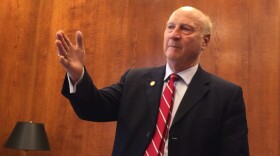A proposed four year tuition freeze appears to have hit a dead end in committee. Senate Bill 75 stalled out despite passionate pleas by sponsor Sen. Dan Seum to stop the sticker shock at state universities and colleges.
In testimony before the Senate Education Committee, Seum argued schools are jacking up tuition far faster than they're being cut - a strategy he claimed is contributing to administrative bloat while plunging students further into debt.
The Fairdale Republican frequently cites his granddaughter, who he says recently graduated Western Kentucky University $40,000 in the red.
"There's a lot of cost that's being dumped on these kids and as I said we're getting very close to a point where getting a degree is not worth the debt," he said.
Opponents of the measure pointed to factors they say were absent from Seum's blistering analysis. They maintain tuition and commensurate debt levels at Kentucky's postsecondary institutions fall well within regional averages and the larger tuition hikes are necessary to offset rising student enrollment, employee healthcare, financial aid, and fixed costs.
University of Kentucky President Eli Capilouto said adding a tuition freeze on top of Gov. Matt Bevin's preferred cuts would hit the school where it hurts.
"These are these first dollars in that go to teachers, advisors, counselors, police, those fundamental things that you need to operate a campus," he told WUKY.
While the bill ultimately fell flat in committee, with members refusing to move on a vote, Seum says he's just getting the ball rolling and he's committed to continuing the fight in this and future sessions.




